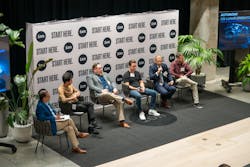Workshop explores role of AI in space exploration
HOUSTON - Experts from academia, industry, and government gathered recently in Houston to examine how artificial intelligence (AI) can transform space exploration. The In-Space Physical AI Workshop, hosted by Rice University’s Office of Innovation in collaboration with the National Aeronautics and Space Administration (NASA), Purdue University, and Houston's Ion Innovation District, brought together more than 200 attendees to discuss AI’s potential to advance scientific discovery and space technology.
NASA’s Nicholas Skytland underscored Houston’s significance as home to the Johnson Space Center and a hub for the growing space economy. “This is just the start of this new era of exploration for space,” Skytland said, urging attendees to consider AI’s applications in areas such as spacecraft navigation and crew health.
The workshop, now in its second year, benefited from a partnership with Purdue University, whose experts shared insights on the integration of AI with space systems.
Shirley Dyke, director of Purdue’s Resilient Extra-Terrestrial Habitats Institute, described the role of AI in enabling autonomous lunar and cislunar infrastructure. “This workshop is a wonderful opportunity to share ideas on how the scientific community can work together to use AI for realizing the next generation of human spaceflight,” she said.
A fireside chat with Norman Garza, executive director of the Texas Space Commission, highlighted Texas’ efforts to attract space technology companies. “Forums such as this one help provide a platform for conversation about how innovation is related to space exploration,” Garza said, encouraging public input on the commission’s strategic planning.
Panels featuring Rice alumni-turned-entrepreneurs showcased commercial applications of AI. Anton Galvas, CEO of AiKYNETIX, discussed AI technology for improving astronauts’ movement efficiency in microgravity. Martin Heyne of Intuitive Machines detailed how AI is enhancing lunar lander safety and building a lunar communications network. James Holley, co-founder of Novium, shared advancements in robotics for extreme space environments.
Related: GITAI demonstrates robotically constructed lunar communications tower
The event also addressed the ethical considerations of AI in autonomous systems, emphasizing the need for accuracy and accountability as reliance on AI grows.
“The potential applications of AI in space are boundless,” Paul said, expressing optimism about Houston’s role in advancing space exploration through collaboration and innovation.
